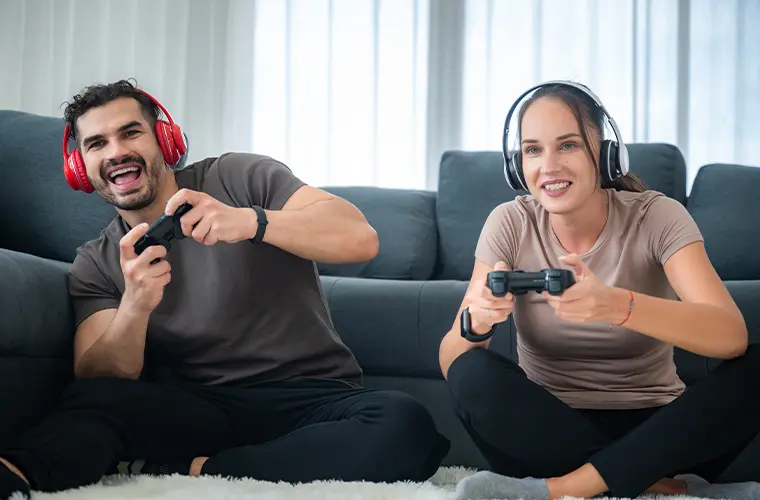A new study from Japanese researchers indicates that playing video games can have an unexpectedly positive effect on mental health.
Research published in Nature Human Behaviour reveals that people who play video games for less than three hours a day report higher life satisfaction, a crucial element of mental well-being, than non-gamers.
However, the study also found that those who play for more than three hours a day experience diminishing psychological benefits, suggesting that moderation is vital to maximizing the positive effects of gaming on mental health.
These findings challenge the often negative perception of video games by highlighting the potential benefits of moderate gaming. Researchers concluded that, when played in moderation, the positive effects on mental health outweigh the possible downsides.
“Previous research has proposed mechanisms for both positive and negative effects of video gaming on mental well-being,” researchers wrote. “Our study found that positive effects outweigh negative effects, resulting from both positive and negative pathways.”
Previous research into the mental health impact of video gaming has primarily been conducted in controlled laboratory settings and has produced inconsistent results.
However, in this recent study, conducted between 2020 and 2022 in Japan, researchers took advantage of a rare opportunity during the COVID-19 pandemic to investigate the causal impact of video gaming on mental health in a real-world setting.
During the COVID-19 pandemic, supply chain disruptions led to a shortage of popular gaming consoles in Japan, such as the Nintendo Switch and PlayStation 5.
Retailers allocated the consoles through lotteries, creating a near-random distribution of gaming opportunities. This unique situation allowed researchers to compare the mental health outcomes of those who won the lottery and were able to purchase a console with those who did not.
The results revealed that individuals who won the lottery and thus had the opportunity to game regularly reported higher life satisfaction.
On average, life satisfaction scores increased by 0.2 to 0.6 standard deviations among those who were able to purchase gaming consoles, a significant improvement in psychological well-being. Additionally, the study found a reduction in psychological distress among gamers, with a 0.1 to 0.6 standard deviation decrease in distress levels.
This isn’t the first time video games have been associated with positive mental health outcomes. Previous research has shown that certain games, particularly those involving social interaction or problem-solving, can enhance cognitive abilities and foster social connections.
For example, a 2022 German study found that people playing social video games reported fewer feelings of loneliness during the COVID-19 pandemic. Another study published in Nature in 2022 revealed that gaming improved children’schildren’s general intelligence.
Additionally, a 2024 Austrian study found no evidence linking violent video games to reduced empathy or users becoming numb to real-world violence. These findings contradict longstanding concerns that playing violent video games can lead to increased instances of real-world violence.
However, using a robust natural experiment design, this recent Japanese study is among the first to establish a causal link between gaming and enhanced life satisfaction.
Despite these promising findings, it’s essential to consider the broader context.
Video games have long been a double-edged sword in the mental health debate. On one hand, they offer entertainment, a sense of achievement, and opportunities for social interaction, particularly in multiplayer formats. On the other hand, excessive gaming has been associated with negative outcomes such as addiction and social isolation.
In the 11th revision of its International Classification of Diseases (ICD-11), the World Health Organization (WHO) lists “gaming disorder” as a psychological disorder and significant global health-related condition. WHO defines “gaming disorder” as “impaired control over gaming” that has a significant negative impact on “a person’s functioning in personal, family, social, educational, occupational or other important areas.”
In the current edition of the Diagnostic and Statistical Manual of Mental Disorders (DSM-5-TR), the American Psychiatric Association (APA) determined that there is not enough evidence to formally classify “Internet Gaming Disorder” as a psychological disorder. However, the APA encourages further research on the topic to better understand its potential impact and implications.
The controversy surrounding the relationship between video games and mental health primarily revolves around whether gaming disorders should be considered a distinct clinical condition or if they are manifestations of underlying psychiatric disorders.
In this recent study, researchers did not dismiss the concerns about video games. Instead, they highlighted the need for a balanced perspective on gaming.
While moderate gaming appears to enhance life satisfaction, the study also found that the benefits diminish with excessive play. For instance, gaming for more than three hours a day was associated with smaller gains in mental well-being compared to more moderate gaming.
Moreover, the research found that gaming’s impact on mental health varied across different demographic groups. For example, the benefits were more pronounced among younger individuals and those not employed full-time. This suggests that the context in which gaming occurs, including factors like age, employment status, and the type of games played, can influence its effects on mental health.
Ultimately, the findings add to the growing research exploring the nuanced relationship between gaming and mental health. While there is evidence that gaming can have positive effects, especially regarding life satisfaction, it is clear that these benefits are not universal.
For some, gaming can lead to problems such as addiction and social withdrawal, highlighting the need for a tailored approach to gaming as a leisure activity.
As video games continue to evolve, becoming more immersive and socially connected, understanding their impact on mental health will be increasingly important. This study offers a crucial piece of the puzzle, suggesting that, when approached in moderation, gaming can be a positive force in people’s lives.
However, researchers caution that more study is needed to fully understand gaming’s long-term effects and identify which games are most beneficial.
“These findings highlight the necessity for further research into the mechanisms underlying video gaming’s effects on mental well-being and point to the importance of policy design that considers the differential effects of various digital media screen time for diverse populations,” researchers concluded.
Nevertheless, for those who enjoy gaming, this study offers reassurance that their hobby might not just be harmless—it could actually contribute to a happier, more satisfying life.
Tim McMillan is a retired law enforcement executive, investigative reporter and co-founder of The Debrief. His writing typically focuses on defense, national security, the Intelligence Community and topics related to psychology. You can follow Tim on Twitter: @LtTimMcMillan. Tim can be reached by email: tim@thedebrief.org or through encrypted email: LtTimMcMillan@protonmail.com

